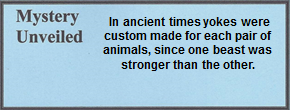12.01.04 Mt. 11:28-30
REST FOR THE WEARY
28 Come to me,
all of you who are weary and burdened,
and I will give you rest.
29 All of you,
take up My yoke and learn from Me,
because I am gentle and humble in heart,
and you will find rest for yourselves. 30 For My yoke is easy and My burden is light.
This imagery of a yoke was not new to His listeners. The Oral Law referred to one who would pick up the yoke of the Mosaic Law and He would be delivered from the oppressive yoke of worldly cares. The phrase “worldly care” (below) referred to the encroaching Greek culture. The rabbinic literature reads as follows:
Rabbi Nehunya ben Ha-Kanah said:
“He that takes upon himself the yoke of the Law,
from him shall be taken away the yoke of the kingdom
(meaning the troubles suffered at the hands of those in political power)
and the yoke of worldly care.
But he that throws off the yoke of the Law,
upon him shall be laid the yoke of the kingdom
and the yoke of worldly care.”
Mishnah, Aboth 3.5
There is an astounding parallel to the words of Jesus that predate Him by more than a century from the book of Ben Sirach. The Inter-Testament writer said this:
Draw near to me, you unlearned, and lodge in the house of study. Why are you slow, and what do you say about these things, your souls being very thirsty? I opened my mouth and said, “Buy her [wisdom] for yourselves without money. Put your neck under [her] yoke, and let your soul receive instruction. She is to be found nearby. See with your eyes how, with only a little labor, I have gotten much rest.
Ben Sirach 51:23-27[1]
These two quotations demonstrate again how the message of righteousness that had been preached by so many righteous rabbis, was foundational to the kingdom of God message presented by Jesus.
“Take up My yoke and learn from Me.” The traditional yoke was a device placed on the necks of two draft animals to cause them to work as a team and allow them to pull a farm implement such as a plow. Using this imagery, Jesus said His yoke is easy, meaning that whoever would pick up the “yoke,” would be yoked to Him. In ancient times, yokes were custom made for each pair of animals, since one beast was the stronger than the other. To be yoked with Jesus means to work with Him for a specific ministry. He is the stronger member of the team, and hence, the burden is light.
It also had a reference to the rabbi’s teaching, philosophy and interpretation of Scripture.[2] Jesus is referred to as a teacher forty-one times, indicating that as a teacher He would help those who would follow Him. Learning His lessons would not be difficult, but living them could be more challenging.
So why did Jesus say that His yoke was easy or light? The Greek word for easy is chrestos, which means well fitting.[3] It was certainly a term with which Jesus was well acquainted, since as a carpenter, he had made so many of them (yokes). In comparison to the rigorous requirements demanded by leading Pharisees and their Oral Law, the requirements of Jesus were relatively easy to obey.

“My yoke is easy.” For nearly three centuries after Jesus, Christians were tortured and martyred which, amazingly, was a purification element and helped the church to grow and expand into many nations. Many Christians today, especially those living in persecuting countries, understand that all too well. To follow Christ; to live a life that honors God and upholds biblical principles, is not always easy in the modern sense of the word. The issue of persecution was never hidden in the discussions of Jesus, although it is seldom the subject of sermons today. Concerning the biblical phrase, the word easy would be better translated wholesome, serviceable, and kindly.[4] The hidden message of being “yoked with Jesus” is that He is the stronger one and the believer is the weaker one. In that sense, being yoked with Jesus is serviceable and kind.
[1]. Cited by Bivin, bracketed inserts by Bivin, New Light on the Difficult Words of Jesus, 23-24.
[2]. http://www.jewishrootsofchristianity.org/jewishroots/discipleship-in-jesus-day.pdf Retrieved January 12, 2012.
[3]. Barclay, “Matthew.” 2:17.
[4]. Vincent, Word Studies in the New Testament. 1:70.